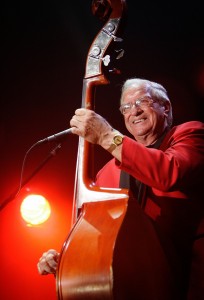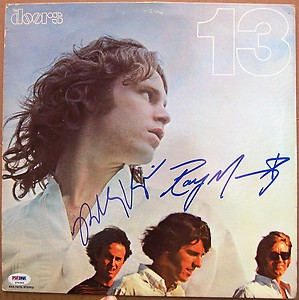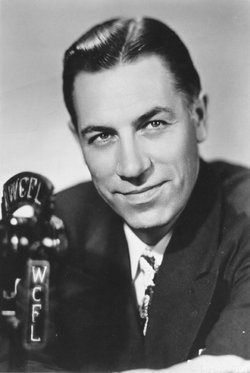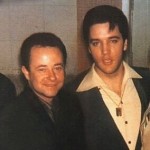Obituaries
Marshall Lytle (September 1, 1933 – May 25, 2013) was an American rock and roll bassist, best known for his work with the groups Bill Haley & His Comets and The Jodimars in the 1950s.
Born in Old Fort, North Carolina, Lytle was a guitar player before joining Bill Haley’s country music group, The Saddlemen, in 1951. But Lytle was hired to play double bass for the group, replacing departing musician Al Rex, so Haley taught Lytle the basics of slap bass playing. Lytle, who was only a teenager at the time, grew a moustache in order to look a little older, and became a full-time member of The Saddlemen and, in September 1952, he was with the group when they changed their name to Bill Haley & His Comets. Soon after, Lytle co-wrote with Haley the band’s first national hit, “Crazy Man, Crazy” although he did not receive co-authorship credit for it (until 2002).
Lytle played on all of Haley’s recordings between mid-1951 and the summer of 1955, including the epochal “Rock Around the Clock” in 1954.
He played a late 1940s model Epiphone B5 upright double bass, purchased in October, 1951, for about $275. He used gut strings for the G and D strings while the A and E strings were wound. Lytle’s style of playing, which involved slapping the strings to make a percussive sound, is considered one of the signature sounds of early rock and roll and rockabilly. The athletic Lytle also developed a stage routine, along with Ambrose, that involved doing acrobatic stunts with the bass fiddle, including throwing it in the air and riding it like a horse.
In 2012, Lytle was inducted as a member of the Comets into the Rock and Roll Hall of Fame.
Read more here: http://en.wikipedia.org/wiki/Marshall_Lytle
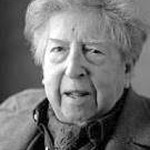 Henri Dutilleux (French pronunciation: [ɑ̃ʁi dytijø]; 22 January 1916 – 22 May 2013) was a French composer active mainly in the second half of the 20th century. His work, which has garnered international acclaim, follows in the tradition of Maurice Ravel, Claude Debussy, and Albert Roussel, but in an idiosyncratic style.
Henri Dutilleux (French pronunciation: [ɑ̃ʁi dytijø]; 22 January 1916 – 22 May 2013) was a French composer active mainly in the second half of the 20th century. His work, which has garnered international acclaim, follows in the tradition of Maurice Ravel, Claude Debussy, and Albert Roussel, but in an idiosyncratic style.
Dutilleux numbered as Op. 1 his Piano Sonata (1946–1948), written for pianist Geneviève Joy, whom he had married in 1946. He renounced most of the works he composed before it because he did not believe them to be representative of his mature standards, considering many of them to be too derivative to have merit.
Dutilleux died 22 May 2013 in Paris.
Awards and prizes:
Grand Prix de Rome (for his cantata L’Anneau du Roi) – 1938
UNESCO’s International Rostrum of Composers (for Symphony No. 1) – 1955
Grand Prix National de Musique (for his entire oeuvre) – 1967
Praemium Imperiale (Japan – for his entire oeuvre) – 1994
Prix MIDEM Classique de Cannes (for The Shadows of Time) – 1999
Ernst von Siemens Music Prize (for his entire oeuvre) – 2005
Prix MIDEM Classique de Cannes (for his entire oeuvre) – 2007
Cardiff University Honorary Fellowship (for his entire oeuvre) – 2008
Gold Medal of the Royal Philharmonic Society – 2008
Kravis Prize – 2011
Grand-Croix de la Légion d’honneur – 2004
Read more at: http://en.wikipedia.org/wiki/Henri_Dutilleux
Raymond Daniel Manczarek, Jr., known as Ray Manzarek (February 12, 1939 – May 20, 2013), was an American musician, singer, producer, film director and author, best known as a founding member and keyboardist of “The Doors” from 1965 to 1973. He was a co-founding member of Nite City from 1977 to 1978, and of Manzarek–Krieger from 2001 to his death.
From 1962 to 1965, he studied in the Department of Cinematography at the University of California, Los Angeles (UCLA), where he met film student Jim Morrison. At UCLA, he also met Dorothy Fujikawa, whom he married. They have a son, Pablo. Forty days after finishing film school, thinking they had gone their separate ways, Manzarek and Morrison met by chance on Venice Beach in California. Morrison said he had written some songs, and Manzarek expressed an interest in hearing them, whereupon Morrison sang a rough version of “Moonlight Drive”. Manzarek liked the songs and co-founded the Doors with Morrison at that moment.
Manzarek occasionally sang for the Doors, including the live recording “Close To You” and on the B-side of “Love Her Madly,” “You Need Meat (Don’t Go No Further).” He also sang on the last two Doors albums, recorded after Morrison’s death, Other Voices and Full Circle. Additionally, he provided one of several guitar parts on the song “Been Down So Long.”
Read more at: http://en.wikipedia.org/wiki/Ray_Manzarek
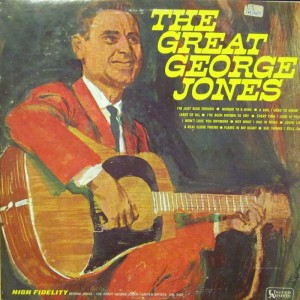 George Glenn Jones (September 12, 1931 – April 26, 2013) was an American country music singer known for his long list of hit records, his distinctive voice and phrasing, and his marriage to Tammy Wynette.
George Glenn Jones (September 12, 1931 – April 26, 2013) was an American country music singer known for his long list of hit records, his distinctive voice and phrasing, and his marriage to Tammy Wynette.
Over the past 20 years, Jones has frequently been referred to as the greatest living country singer.
Throughout his long career, Jones made headlines often as much for tales of his drinking, stormy relationships with women, and violent rages as for his prolific career of making records and touring. His wild lifestyle led to Jones missing many performances, earning him the nickname “No Show Jones.”
The shape of his nose and facial features have given Jones the nickname “The Possum.”
George Jones has been a member of the Grand Ole Opry since 1956. Jones has received many honors during his long career, from Most Promising New Country Vocalist in 1956, being inducted into the Country Music Hall of Fame in 1992, and being named a Kennedy Center Honoree in 2008. In 2012 he was presented with a Grammy Lifetime Achievement award. At the ceremony his longtime friend Merle Haggard paid tribute to him.
George Jones died April 26, 2013 at Vanderbilt University Medical Center in Nashville, Tennessee. He was hospitalized April 18 with fever and irregular blood pressure.
A True Country Music Legend – “George Jones”
Read more at: http://en.wikipedia.org/wiki/George_Jones
104 years old.
George Beverly Shea was a Canadian-born American gospel singer and hymn composer. Shea was often described as “America’s beloved Gospel singer” and was considered “the first international singing ‘star’ of the gospel world,” as a consequence of his solos at Billy Graham Crusades and his exposure on radio, records, and television.
Shea himself has said that he became a Christian at the age of five or six, but made a re-dedication to Christ when he was 18:
There were times when I needed to rededicate my life to the Lord Jesus. When I was 18, my dad was pastoring a church in Ottawa, and I was feeling not too spiritual. The church was having a “special effort,” as they called it, for a week. I remember that on Friday night Dad came down from the pulpit and tenderly placed his hand on my shoulder. He whispered, “I think tonight might be the night, son, when you come back to the Lord.” Whatever Dad did or said, I listened to him and respected him. And, yes, that was the night!
Shea accepted Christ again as his Saviour at the Sunnyside Wesleyan Methodist Church in Ottawa, Canada.
During his career, Shea was nominated for ten Grammy Awards, winning on March 15, 1966, the 1965 Best Gospel or Other Religious Recording (Musical) for his album “Southland Favorites” (RCA LSP-3440) recorded with the Anita Kerr Quartet.
On February 12, 2011, Shea received the 2010 Lifetime Achievement Grammy Award.
Read more at: http://en.wikipedia.org/wiki/George_Beverly_Shea
Gordon Stoker lived to be 88 years old. He died at his home in Brentwood, TN.
Stoker was a native of Gleason, Tennessee, where he grew up in a musical family.
1st there was the “Foggy River Boys”. When Gordon Stoker replaced Bob Money as the pianist a new group was formed named the “Melodizing Matthews”. The group was based in Springfield, Missouri.
The Melodizing Matthews soon changed their name to The Jordanaires, after Jordan Creek in Missouri—not after the Jordan River, as many have thought.
Gordon Stroker was a tenor singer for the Jordanaires from 1951 to 2013.
Read more at: http://www.jordanaires.net/
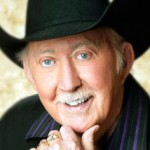 Jack Greene (January 7, 1930 – March 15, 2013) was an American country musician. Nicknamed the “Jolly Greene Giant” due to his height and deep voice, Greene was a long time member of the Grand Ole Opry. A three-time Grammy Award nominee, Greene is best-known for his 1966 hit “There Goes My Everything.” The song dominated the Country music charts for nearly two months in 1967 and earned Greene “Male Vocalist of the Year”, “Single of the Year”, “Album of the Year” and “Song of the Year” honors from the Country Music Association. Green had a total of five #1 Country hits and three others that reached the Top Ten.
Jack Greene (January 7, 1930 – March 15, 2013) was an American country musician. Nicknamed the “Jolly Greene Giant” due to his height and deep voice, Greene was a long time member of the Grand Ole Opry. A three-time Grammy Award nominee, Greene is best-known for his 1966 hit “There Goes My Everything.” The song dominated the Country music charts for nearly two months in 1967 and earned Greene “Male Vocalist of the Year”, “Single of the Year”, “Album of the Year” and “Song of the Year” honors from the Country Music Association. Green had a total of five #1 Country hits and three others that reached the Top Ten.
Billboard magazine named Greene one of the Top 100 “Most Played Artists”.
Jack Greene’s first Top 40 hit came in early 1966 with Ever Since My Baby Went Away, peaking at #37. Later that year, Decca released what would become his signature song, There Goes My Everything. The song reached #1 and stayed on top of the Country charts for 7 weeks while also becoming a crossover hit; the album stayed No. 1 for an entire year.
Read more at: http://en.wikipedia.org/wiki/Jack_Greene
 Previously a member of Samson, Burr joined Iron Maiden in 1979. An acquaintance of then-Iron Maiden guitarist Dennis Stratton, Burr played on their first three records: Iron Maiden, Killers and their breakthrough release The Number of the Beast. Burr was fired from the band in 1982 during The Beast on the Road tour. He was replaced by the band’s current drummer, Nicko McBrain. Burr co-wrote one song on The Number of the Beast, “Gangland”, and another song, “Total Eclipse”, that was cut from the album and showed up as the b-side of the “Run to the Hills” single, and later on the Number Of The Beast remastered CD re-release.
Previously a member of Samson, Burr joined Iron Maiden in 1979. An acquaintance of then-Iron Maiden guitarist Dennis Stratton, Burr played on their first three records: Iron Maiden, Killers and their breakthrough release The Number of the Beast. Burr was fired from the band in 1982 during The Beast on the Road tour. He was replaced by the band’s current drummer, Nicko McBrain. Burr co-wrote one song on The Number of the Beast, “Gangland”, and another song, “Total Eclipse”, that was cut from the album and showed up as the b-side of the “Run to the Hills” single, and later on the Number Of The Beast remastered CD re-release.
Burr also appeared on “The Number of the Beast” and “Run To The Hills” videos.
Iron Maiden lead singer Bruce Dickinson considered Burr to be “…the best drummer the band ever had.
Read more at: http://en.wikipedia.org/wiki/Clive_Burr
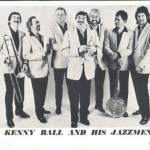 Kenneth Daniel Ball ( 22 May 193 – 7 March 2013) was an English jazz musician, best known as the bandleader, lead trumpet player and vocalist in Kenny Ball and his Jazzmen.
Kenneth Daniel Ball ( 22 May 193 – 7 March 2013) was an English jazz musician, best known as the bandleader, lead trumpet player and vocalist in Kenny Ball and his Jazzmen.
Ball was born in Ilford, Essex. At the age of 14 he left school to work as a clerk in an advertising agency, but also started taking trumpet lessons. He began his career as a semi-professional sideman in bands, whilst also working as a salesman and for the advertising agency. He turned professional in 1953 and played the trumpet in bands led by Sid Phillips, Charlie Galbraith, Eric Delaney and Terry Lightfoot before forming his own trad jazz band – Kenny Ball and his Jazzmen – in 1958. His dixieland band was at the forefront of the early 1960s UK jazz revival.
In 1961 their recording of Cole Porter’s “Samantha” became a hit, and in March 1962 they reached No. 2 on both the U.S. Billboard Hot 100 chart and the UK Singles Chart, with “Midnight in Moscow”. The record sold over one million copies, earning gold disc status.
Read more at: http://en.wikipedia.org/wiki/Kenny_Ball
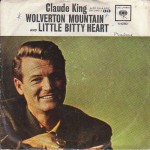 “Wolverton Mountain” was a hit that launched Claude King’s career as an American country singer/songwriter in 1962. The song was written together with Merle Kilgore and was based on a real character, Clifton Clowers, who lived on Wolverton Mountain, north of Morrilton, Arkansas. The song spent nine weeks at the top of the Billboard country chart in the US in 1962. It was also a giant crossover hit, reaching number six on the pop chart and number three on the easy listening chart.
“Wolverton Mountain” was a hit that launched Claude King’s career as an American country singer/songwriter in 1962. The song was written together with Merle Kilgore and was based on a real character, Clifton Clowers, who lived on Wolverton Mountain, north of Morrilton, Arkansas. The song spent nine weeks at the top of the Billboard country chart in the US in 1962. It was also a giant crossover hit, reaching number six on the pop chart and number three on the easy listening chart.
Claude King’s singles: The Comancheros ( 1961 ), Wolverton Mountain ( 1962 ), The Burning Of Atlanta ( 1962 )
Read more at: http://en.wikipedia.org/wiki/Claude_King
